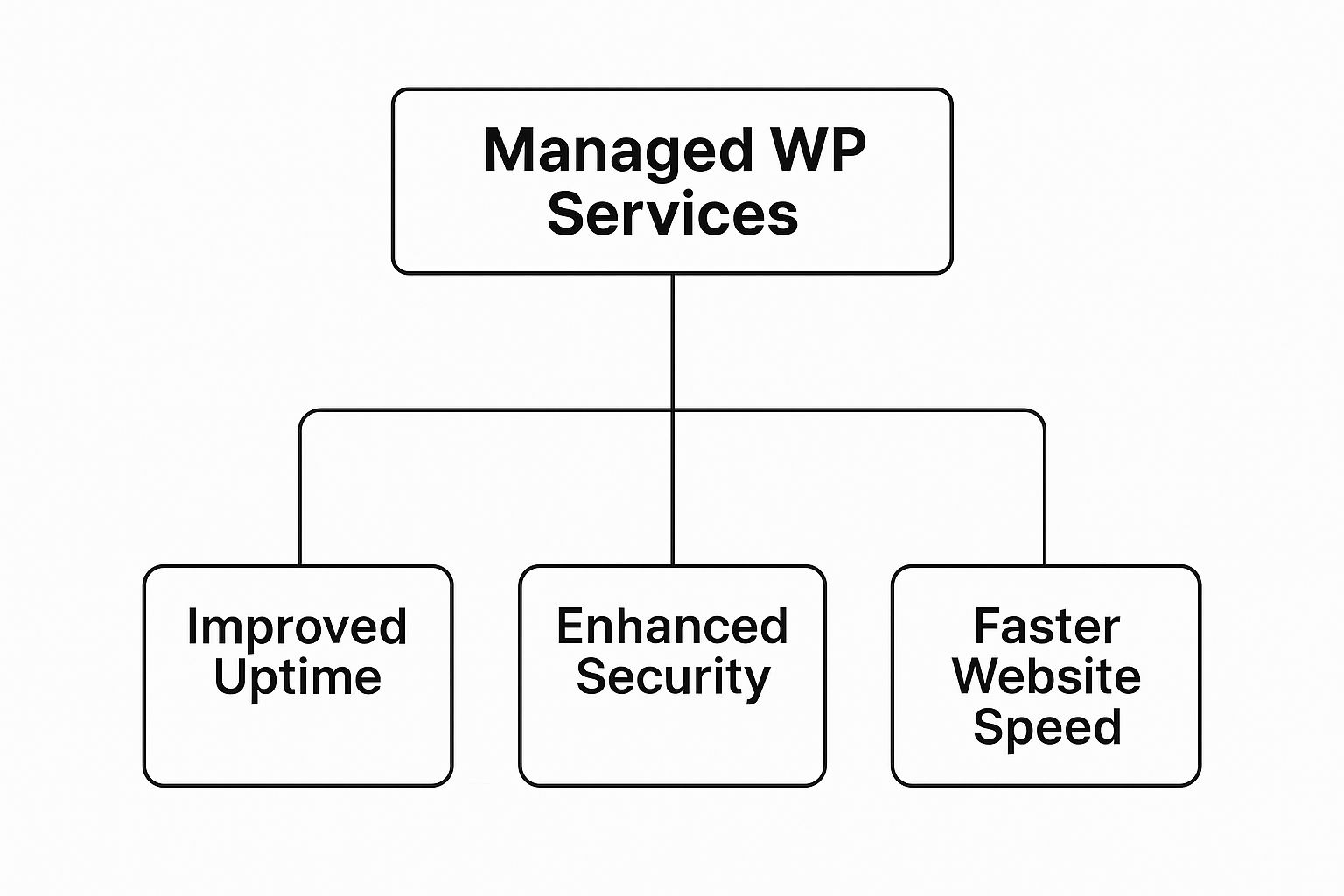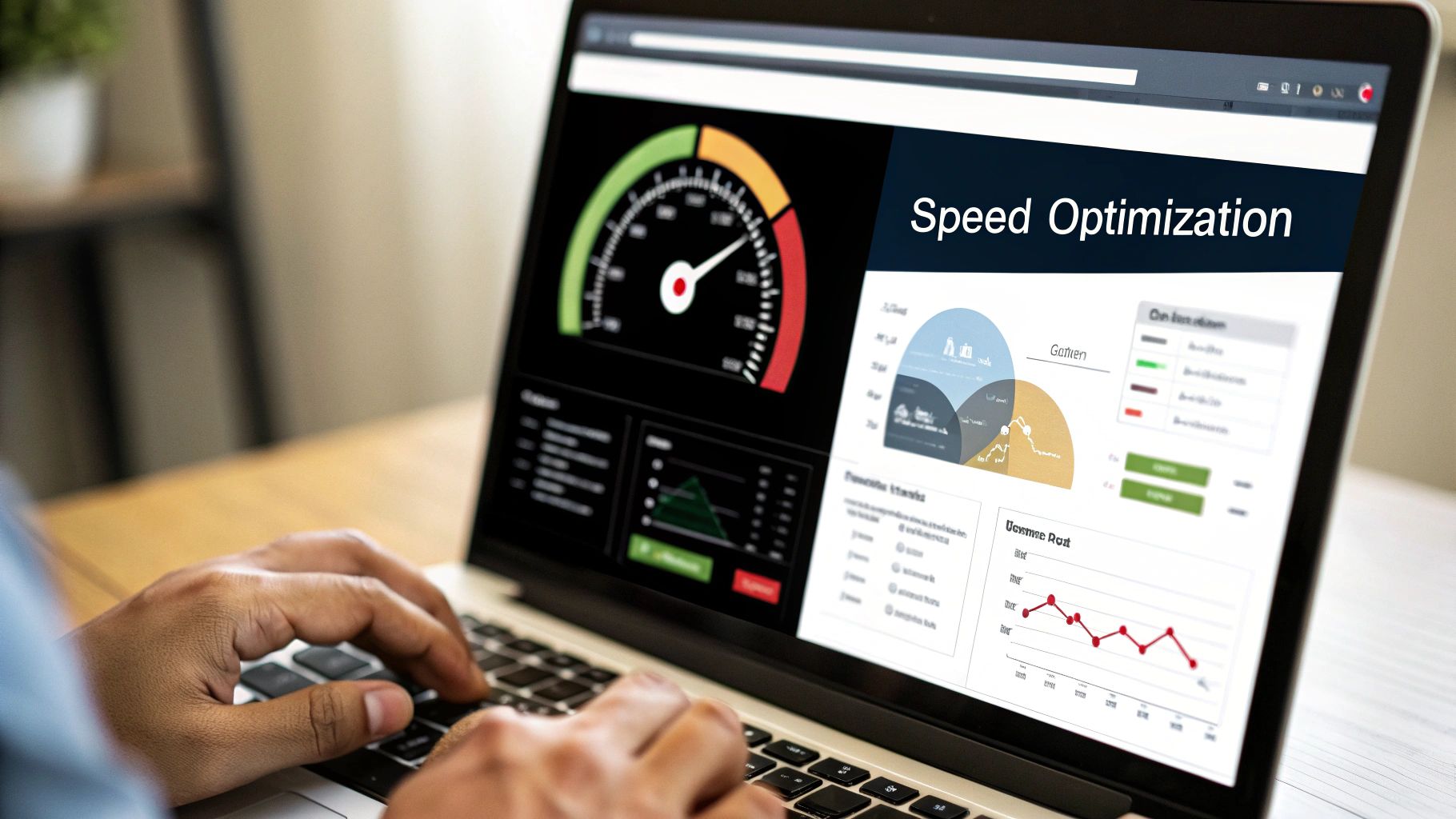So, what exactly is a WordPress website management service? In simple terms, think of it as having a friendly, expert crew dedicated to all the technical, behind-the-scenes work that keeps your website healthy, secure, and running smoothly. It’s like hiring a property manager for your digital shopfront—they handle everything from security checks to performance tune-ups, so you can focus on your business.
Your WordPress Website: An Asset Worth Protecting

Getting your WordPress website live is a fantastic achievement, but the journey doesn’t stop there. Just like a physical shop or office, your site needs regular attention to stay in top shape and remain a valuable business asset. If you let things slide, it can slowly start to show cracks, putting your hard work and reputation at risk.
This is where proactive website management makes all the difference. It’s all about consistently looking after the technical side of your site to prevent problems before they even have a chance to start.
More Than Just a Safety Net
Many people think of website support as a helpline you call only when something breaks. While having an expert ready to jump in during an emergency is crucial, proper management is built on prevention, not just reaction. It’s a continuous, ongoing process of keeping your site in peak condition.
A professional WordPress website management service takes care of the critical tasks that are easy to overlook but are essential for a reliable online presence. This typically includes:
- Keeping everything up-to-date: Regularly updating the WordPress core software, along with all your themes and plugins, to close security gaps and ensure everything works together harmoniously.
- Creating reliable backups: Scheduling frequent, secure backups of your entire site. This means if the worst should happen, you can get back online quickly and with minimal fuss.
- Monitoring for threats: Actively scanning your site around the clock for malware, hacking attempts, and other security vulnerabilities.
- Optimising for speed: Fine-tuning your site’s performance to make sure it loads quickly for every visitor—something that’s vital for user experience and search engine rankings.
By taking these jobs off your hands, a management service frees you up to focus on what you do best: running and growing your business.
In this guide, we’ll explore what these services really cover, look at the serious risks of letting your site go unmanaged, and break down the real-world benefits of professional care. The goal is to give you a clear, straightforward understanding of why investing in your website's health is one of the smartest moves you can make.
So, What Does a WordPress Management Service Actually Do?
It’s easy to think of a website as a 'set it and forget it' kind of thing. You build it, launch it, and it just works, right? Well, not quite. A healthy WordPress site is more like a garden than a statue; it needs regular, proactive care to truly thrive.
So, what exactly does a WordPress website management service do to keep your corner of the internet flourishing? Let's pull back the curtain and look at the core tasks that keep a website secure, fast, and reliable. These aren't just one-off fixes but ongoing processes designed to stop problems before they can affect your business.
To give you a clear overview, here are the essential tasks bundled into a typical management service and why they're so important for your site's health.
Core Components of a WordPress Management Service
| Service Component | What It Is | Why It's Important |
|---|---|---|
| Consistent Updates | Regularly updating the WordPress core, themes, and plugins to their latest versions in a safe, tested environment. | Patches security holes, adds new features, and prevents conflicts between different software components. |
| Security Monitoring | Proactive, 24/7 monitoring, including malware scans, firewall management, and suspicious activity detection. | Protects your site from hackers and bots, safeguarding your data and your customers' trust before a breach occurs. |
| Regular Backups | Scheduling and storing complete copies of your website's files and database in a secure, off-site location. | Acts as your ultimate safety net, allowing for a quick and complete restoration if your site is ever compromised or fails. |
| Performance Tuning | Ongoing optimisation of site speed through image compression, database clean-up, caching, and other fine-tuning. | Improves user experience, reduces bounce rates, and boosts your SEO rankings by ensuring your pages load quickly. |
| Expert Support | Access to a team of WordPress professionals for troubleshooting, advice, and making small changes or fixes. | Saves you from a world of frustration, giving you a reliable point of contact for any technical questions or issues. |
Each of these elements plays a vital role in maintaining a professional and effective online presence, freeing you up to focus on your business.
Consistent Updates for Core, Themes, and Plugins
Think of your WordPress site as a complex machine built from three main parts: the WordPress core (the engine), your theme (the bodywork), and your plugins (the extra features and gadgets). Each part is made by different developers who are constantly releasing updates to add functionality, improve performance, and—most importantly—patch security holes.
A management service handles this entire process. This isn't just about clicking the 'update' button, which can sometimes break your site. A professional team tests updates on a staging site first to ensure everything works perfectly before pushing them live. This is critical, as a huge number of WordPress vulnerabilities are often traced back to outdated third-party plugins.
Rock-Solid Security Monitoring and Protection
Your website is a valuable business asset, and like any asset, it needs protecting. Hackers and malicious bots are constantly scouring the internet for weak spots to exploit. A management service acts as your 24/7 digital security guard.
Security isn't a one-time setup; it's a continuous process of vigilance. A management service provides that constant oversight, so you don't have to worry about the latest threats.
This involves setting up firewalls to block malicious traffic, actively scanning for malware, and watching for any suspicious activity. If a threat is found, the team can jump on it immediately to neutralise it and secure your site, often before you even know there was a problem.
The image below gives you a sense of how these managed services all contribute to a healthy, high-performing website.

As you can see, it's a cycle where each part—security, speed, and updates—reinforces the others to create a reliable experience for your visitors.
Regular Backups and Swift Recovery
Let's imagine the worst for a moment: your website gets hacked or a server fails, and everything disappears. If you don't have a recent backup, you could lose years of hard work in an instant. This is why regular, reliable backups are the ultimate safety net and a cornerstone of any good management plan.
A service will schedule automatic backups of your entire site—all the files, images, and the database—and store them securely off-site. Storing them separately is key, as it means the backups won't be affected if your server itself is compromised. If you're curious about the details, we have a helpful guide explaining how to back up your WordPress site. This process ensures that if disaster ever strikes, your site can be restored quickly.
Performance and Speed Optimisation
Nobody likes a slow website. A page that takes too long to load will frustrate visitors and send them clicking the 'back' button. Search engines don't like slow sites either. A management service works continuously to keep your site running lightning-fast.
This involves all sorts of technical tweaks, from optimising your images so they load faster to cleaning up your database and setting up clever caching systems. It's all about shaving off those precious milliseconds to give every user a smooth, seamless experience.
With WordPress powering around 43% of all websites in the UK, its popularity is undeniable. But this also makes it a huge target for attackers, highlighting just how important proper management is for the thousands of UK businesses that depend on it.
In the end, a WordPress website management service bundles all these crucial jobs—updates, security, backups, and optimisation—into one helpful package. It’s about taking the technical headaches off your plate so you can get back to what you do best.
The Hidden Dangers of Neglecting Your WordPress Site
Letting a WordPress website run on its own is a bit like leaving your front door unlocked. You might be fine for a while, but you're essentially inviting trouble to walk right in. The consequences aren't just minor annoyances; they can seriously damage your business, your reputation, and your bottom line.
Understanding these risks isn't about scaremongering. It's about seeing why a WordPress website management service is such a smart, preventative investment. Let's take a look at what can happen when a site is left to fend for itself.
The Slow Creep of Security Vulnerabilities
One of the biggest threats to an unmanaged WordPress site is the gradual decay of its security. WordPress is the most popular website platform in the world, which is great, but it also paints a huge target on its back for hackers and automated bots looking for an easy way in.
These attackers aren't usually targeting you personally. They run automated scripts that scan thousands of sites, probing for well-known weaknesses—the vast majority of which are found in outdated software. Whenever developers release an update for WordPress, a theme, or a plugin, they often publish details about the security holes they've just patched. This is fantastic for owners who update promptly, but it’s a public roadmap for hackers to exploit any site that’s lagging behind.
Failing to keep up with updates can lead to some genuinely nasty outcomes:
- Malware Infections: Harmful code can be injected into your site, redirecting your visitors to spammy websites or even using your server to send out phishing emails.
- Data Breaches: If you store any customer information, a breach could expose that sensitive data. This instantly erodes trust and can have serious legal consequences.
- Search Engine Blacklisting: Google actively blacklists sites it flags as harmful. If you end up on that list, you'll be removed from search results, making you invisible to potential customers.
Neglecting updates is like ignoring a recall notice for your car. The manufacturer has identified a serious fault and provided a fix, but if you don't act, you're driving at your own risk.
Performance Degradation and Poor User Experience
Have you ever landed on a website that took forever to load? You probably hit the back button pretty fast. Over time, a neglected website almost always becomes a slow website.
This happens for all sorts of reasons. The database gets bloated with old data and spam comments, images aren't optimised for the web, and outdated code just isn't as efficient. The end result is a sluggish, frustrating experience for your visitors. Study after study shows that even a one-second delay in page load time can cause a significant drop in conversions. A slow site doesn't just annoy people; it actively sends them to your competitors.
On top of that, site speed is a huge ranking factor for Google. A slow site will always struggle to rank well, harming your organic traffic and undermining your SEO efforts. Proactive maintenance is what keeps a site feeling quick and responsive, ensuring a smooth experience for every user.
The Risk of Catastrophic Data Loss
Without a solid backup strategy, your entire website is walking a tightrope. A single server crash, a plugin update gone wrong, or a security breach could wipe out everything you’ve built in an instant. All that content, your carefully crafted design, and customer data could simply be gone.
Relying solely on your web host's backups can be a gamble. They might not be as frequent or as easy to restore as you'd need in a real emergency. A proper management plan involves setting up regular, independent backups stored securely in a separate, off-site location. This is your ultimate safety net, ensuring that no matter what happens, your digital home can be fully restored. For a deeper dive on this, our guide on website security best practices is a great resource.
Ultimately, leaving your site to fend for itself opens you up to a world of preventable risks that can undo all your hard work. Professional management isn't just about fixing things when they break; it's about making sure they don't break in the first place.
The Real Benefits of Professional Website Management

We've talked about the risks of leaving your website to fend for itself. Now, let's shift gears and focus on the positives. Bringing in a WordPress website management service isn't just about avoiding disaster; it’s a strategic move to build a more powerful and dependable online presence.
The real value emerges when you're freed from the technical headaches that pull you away from what you do best. Let's break down the tangible benefits you'll feel when you hand the technical reins to a professional.
The Invaluable Gift of Peace of Mind
For most business owners, this is the big one: peace of mind. It’s the simple relief of knowing your site is being watched over, updated, and secured by people who know exactly what they’re doing.
The nagging "what if" questions start to fade. What if we get hacked? What if an update crashes the site? What if it goes down during our biggest sales event of the year? With a proper management service, those are no longer your problems to solve alone.
You get to stop being the reluctant, part-time IT manager. Instead, you can pour all that energy back into your strategy, your customers, and actually growing your business. That mental space is incredibly valuable.
This proactive approach turns your website from a source of stress into a reliable tool that just works, day in and day out.
Protecting Your Hard-Earned Reputation
Your website is your digital shopfront. It's often the very first impression a potential customer has of your brand. A slow, buggy, or insecure site doesn't just look unprofessional; it can actively harm your reputation and make people question whether they can trust you.
Think about it from a customer's perspective. They try to buy something, but the checkout keeps failing. Or worse, they land on your site only to be greeted by a security warning from their browser. That kind of damage to your credibility can take a long time to repair.
Professional management helps you maintain a positive reputation by delivering:
- Rock-solid security: Active measures prevent the kinds of breaches that cause public embarrassment and put customer data at risk.
- A seamless user experience: A fast, functional site signals professionalism and shows you value your visitors' time.
- Maximum uptime: Your business is always open online, ready to serve customers whenever they arrive.
Boosting Performance and Driving Growth
A well-maintained website isn't just safer—it's faster and more effective, too. Performance optimisation is a cornerstone of any good WordPress website management service, and the impact on your bottom line is very real.
A faster website directly leads to better business outcomes. It’s a well-known fact that faster loading times improve your search engine rankings, making it easier for new customers to find you on Google.
On top of that, a quick, responsive site keeps people engaged. It dramatically reduces the chance they'll get frustrated and leave (your "bounce rate") and increases the likelihood they’ll complete a purchase or fill out an enquiry form. Simply put, a faster website is often a more profitable website.
Expert Support When You Need It Most
Even with the best preventative care, things can sometimes go wrong. A plugin might not play nicely with a new update, or you might need help with a seemingly small but critical change. Having expert support on call is like having your own dedicated tech team on speed dial.
Instead of losing hours scrolling through confusing online forums, you can just ask someone who knows your website inside and out. This kind of rapid troubleshooting can be the difference between a five-minute fix and a full-blown business disruption.
With a massive number of UK businesses built on WordPress, the demand for this kind of expert help is only growing. You can read more about these trends and discover WordPress statistics for the UK market on MageComp. Professional support ensures your site doesn't get left behind.
Choosing the Right WordPress Management Partner

So, you’ve decided a WordPress website management service makes sense for your business. That’s a great first step. Now comes the important part: finding the right partner. With so many providers out there, it can be easy to feel overwhelmed. It's also tempting to just let price be your guide, but the cheapest plan is rarely the best value in the long run.
Choosing a management partner is about more than offloading a few technical tasks. You're entrusting a critical business asset to someone else. The right partner becomes a true extension of your team, someone who understands what you’re trying to achieve and genuinely cares about your success. Let’s look at how to see past the sales pitch and find a team you can truly count on.
Look Beyond the Checklist of Services
At first glance, most providers seem to offer the same things: updates, backups, security scans, and so on. But the real difference isn't in what they do, but how they do it and the experience of the people involved.
You have to dig a little deeper. Anyone can install a plugin that automatically updates your website, but a true expert will test those updates on a separate staging site first to ensure nothing breaks on your live site. That kind of careful attention to detail is what separates a basic, automated service from a genuine, hands-on partnership.
Key Questions to Ask Any Potential Provider
Before you sign any contracts, it's a good idea to have a proper chat. Think of it as interviewing someone for a vital role in your company, because that’s essentially what it is.
Here are some helpful questions to get the ball rolling:
- How do you communicate, and what do your reports look like? You need to know you'll get regular, easy-to-understand updates on the work being done. And who do you contact when something goes wrong?
- What exactly is included in your plans? Ask them to be specific. If an update causes a problem, is fixing it covered, or will that be an extra charge? Are there limits on support time?
- Can you share a few examples of your technical expertise? A good provider will be happy to talk you through a complex problem they’ve solved for another client. This gives you a real feel for their experience.
Getting clear answers here will help you avoid surprises later on. You can also explore our guide to the best WordPress maintenance services to see how different providers compare.
Understanding Proactive vs Reactive Support
This is one of the most important distinctions to grasp. It's the difference between having a firefighter on call and having a fire inspector who prevents fires from starting in the first place.
Reactive support is when you call for help after something has already gone wrong. Proactive support is about having systems in place to stop things from going wrong in the first place.
A top-tier WordPress website management service is built on a foundation of proactive care. They don’t just wait for you to report that your site is slow; they are constantly monitoring its performance and making small adjustments to keep it running fast. They don’t just clean up a site after it’s been hacked; they implement robust security to stop attackers from ever getting a foothold.
While every good service needs to have fast reactive support for emergencies, it’s the proactive approach that delivers genuine peace of mind and keeps your website stable for the long haul.
Evaluating a WordPress Management Provider
Finding the right fit requires a bit of homework. This table gives you a checklist to help you compare different services and make sure you’re choosing a reliable partner who aligns with your business needs.
| Evaluation Area | Key Questions to Ask | What to Look For |
|---|---|---|
| Technical Expertise | Do you have experience with my specific theme/plugins? Can you share case studies? | Specific, confident answers. Evidence of solving complex problems, not just performing routine tasks. |
| Communication | What does your reporting look like? Who is my main point of contact? What are your response times? | Clear, regular reports (e.g., monthly). A dedicated contact person. A Service Level Agreement (SLA) for support requests. |
| Proactive Strategy | How do you prevent issues before they happen? Do you use staging sites for updates? | A focus on monitoring, performance optimisation, and security hardening. Staging environments are non-negotiable for professionals. |
| Plan Inclusions | What happens if a plugin update breaks my site? Is malware removal included? Are there support time limits? | Transparency. All-inclusive pricing that covers common issues, not a long list of expensive add-ons. |
| Client Reviews | Can I see reviews or speak to a current client? | Genuine, detailed reviews on trusted platforms. Positive feedback on support and reliability. |
| Onboarding Process | What does the setup process involve? How long does it take to get started? | A structured, clear onboarding process that feels organised and secure, not just asking for your login details over email. |
Taking the time to ask these questions will pay dividends, ensuring you find a team that's invested in your success.
Ultimately, you’re looking for a partner who feels more like a co-pilot than just a mechanic. Their focus should be on keeping your website healthy and secure, so you can stay focused on what you do best.
Investing in Your Website Is an Investment in Your Business
Your website is far more than just a collection of pages and code; it’s the digital heart of your business. It works for you 24/7, acting as your best salesperson, your customer service hub, and the public face of your brand. Just like any other crucial business asset, it needs consistent, professional care to perform at its best.
Thinking of a WordPress website management service as just another technical expense is missing the bigger picture. It’s a strategic investment in the stability, security, and long-term success of your entire online operation. It's about freeing you up to focus on driving your business forward, not getting bogged down by technical worries.
It's More Than Just Maintenance
As we've seen, professional website management covers a lot of ground. It's about building a solid foundation for your digital growth. When you partner with experts, you’re not just paying for updates and backups; you’re investing in tangible business benefits that make a real difference.
The core advantages really boil down to this:
- Peace of Mind: Knowing your site is constantly monitored, secured, and kept in peak condition lets you concentrate on what matters most—serving your customers and growing your business.
- Enhanced Security: Proactive protection doesn't just safeguard your data. It protects the trust you’ve worked so hard to build with your audience.
- Optimal Performance: A fast, reliable website creates a great user experience. This has a direct impact on everything from your search engine rankings to your conversion rates.
Entrusting your site to a dedicated team means you can stop being the reluctant IT manager and get back to being the visionary business owner. It’s about delegating the technical complexities so you can focus on your own strengths.
At the end of the day, a well-cared-for website is a powerful tool for growth. It works tirelessly in the background to attract new customers and support your business goals, all without causing you a single headache.
If you have any questions or would like to explore how a management plan could fit your specific website, please feel free to contact us for a friendly chat. We’re here to help you make the best decision for your business.
Meta Description:
Discover why a WordPress website management service is a smart investment in your business's stability, security, and growth. Learn the key benefits today.
FAQ
It's perfectly normal to still have a few questions floating around. Choosing someone to look after your website is a big decision, and you need to feel confident you're making the right call. To help, we've pulled together some of the most common queries we get from business owners.
What Is The Difference Between Web Hosting and Website Management?
This is a great question, and it’s one that trips a lot of people up. The two are closely related but do very different jobs.
Think of it like this:
- Web hosting is the plot of land you rent for your house (your website). The hosting company provides the physical space on a server and the basic connections needed to make sure your site is visible online. It's the foundation.
- Website management is the property manager who looks after the house itself. They're the ones doing the maintenance, fixing the plumbing, upgrading the security system, and generally keeping the property in tip-top shape.
While many hosting companies offer some basic maintenance, a dedicated management service provides a much deeper, more specialised level of care focused entirely on your WordPress site's health.
Can I Not Just Manage My WordPress Site Myself?
You absolutely can, and many business owners do, especially when they're just starting out. The real question is whether you should.
Managing a WordPress site properly is more than just clicking the ‘update’ button. It involves testing those updates on a staging site first, constantly scanning for security holes, optimising the database, and knowing exactly what to do when the dreaded "white screen of death" appears.
For most business owners, the time and energy spent learning and doing all this is time taken away from what they do best: running their business. A management service isn't about giving up; it's about strategically handing off technical tasks to an expert.
Handing over website management isn't admitting defeat; it's a strategic decision to delegate tasks that fall outside your core expertise, freeing you to focus on what you do best.
How Much Does a WordPress Management Service Cost?
Prices vary quite a bit, mostly depending on how much support and what level of service you need.
Basic plans that cover the non-negotiables like updates, security scans, and backups often start around £40-£50 a month. If you need more hands-on help, like performance tuning, e-commerce support, or dedicated developer time, the cost will naturally be higher.
The trick is to think in terms of value, not just price. A plan that costs a little more but prevents a single major security breach or a day of costly downtime has paid for itself many times over. Always check the fine print to see exactly what's included so you can compare apples with apples.
What Happens If My Site Gets Hacked While Under Your Care?
This is one of the most important questions you can ask any provider. While a good WordPress website management service makes a hack extremely unlikely through proactive security, nothing is ever 100% guaranteed.
Any reputable service should have a rock-solid disaster recovery plan. This typically means they'll handle the entire cleanup process as part of your plan, at no extra cost. They should be able to jump into action, identify the intrusion, scrub any malicious code, restore a clean backup, and then find and patch the vulnerability so it doesn’t happen again.
Feeling clearer on what a WordPress website management service can do for your business? At LINX Repair Websites, we offer transparent, expert care to keep your site secure, fast, and running smoothly. This leaves you free to concentrate on what truly matters—growing your business. If you’d like to see how we can help, contact us for a chat.
